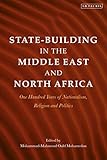State-building in the Middle East and North Africa : one hundred years of nationalism, religion and politics / edited by Mohammad-Mahmoud Ould Mohamedou.
Publisher: London : I.B. Tauris, 2022Description: xii, 277 pages ; 24 cm.Content type: text Media type: unmediated Carrier type: volumeISBN: 9780755601394; 9780755601400.Subject(s): Nation-building -- Middle East -- History | Nation-building -- Africa, North -- History | Middle East -- Politics and government| Item type | Current library | Class number | Status | Date due | Barcode | |
|---|---|---|---|---|---|---|
| Book | House of Lords Library - Palace Library Intake, Ground Floor | 320.956 (Browse shelf(Opens below)) | Issued Being Catalogued. Please contact Library staff. | 10/05/2024 | 022002 |
Includes bibliographical references and index.
Why have state-building projects across the MENA region proven to be so difficult for so long? Following the end of the Ottoman Empire in the early 1920s, the countries of the region began a violent and divisive process of state formation. But a century later, state-building remains inconclusive. This book traces the emergence and evolution of state-building across the MENA region and identifies the main factors that impeded its success: the slow end of the Ottoman Empire; the experience of colonialism; and the rise of nationalistic and religious movements. The authors reveal the ways in which the post-colonial state proved itself authoritarian and formed on the model of the colonial state.
Specialized.
